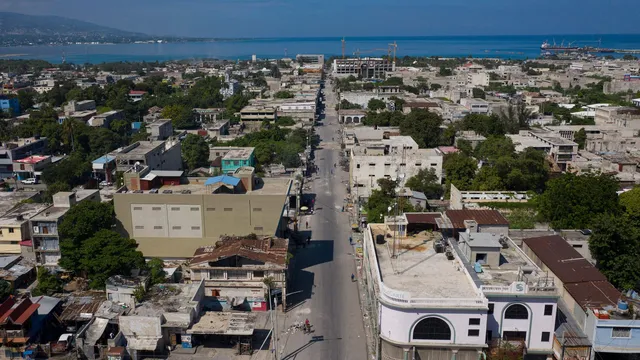
Macron admits France's injustice toward Haiti's independence payments
2025-04-17 23:47- On April 17, 2025, Emmanuel Macron acknowledged the financial burden placed on Haiti by France following its independence.
- The debt imposed on Haiti amounted to a crippling indemnity initially set at 150 million gold francs.
- Macron's address raises questions about the need for reparations as Haiti continues to grapple with the consequences of this historic injustice.
Express your sentiment!
Insights
On April 17, 2025, French President Emmanuel Macron acknowledged the massive financial burden imposed on Haiti following its independence from France. This recognition coincided with the 200th anniversary of the formal acknowledgment of Haiti's independence, which was marked by the imposition of a colossal indemnity. Initially set at 150 million gold francs, the debt was later reduced but remained crippling for Haiti, forcing the nation to borrow funds from French banks to meet France's demands. Payments reportedly continued until 1947, severely hindering Haiti's economic growth and contributing to its ongoing struggles. In his address, Macron highlighted how this financial indemnity placed a heavy price on Haiti's freedom, effectively subjecting its people to a lengthy period of financial obligation that enriched lenders while deepening poverty in the nation. Macron announced plans to form a joint historical commission with Haiti to examine the shared past of the two countries. While he recognized the historic injustice, he did not directly address the calls for reparations from Haitian leaders and advocacy groups. The response from advocacy groups has been one of cautious optimism; while they view Macron's acknowledgment as a positive step, they insist that true reparations are necessary to address the long-standing consequences of colonization and exploitation. Leaders from the Caribbean Community (CARICOM) have echoed these sentiments, arguing that historical injustices concerning the treatment of formerly enslaved individuals have left lasting scars in the region. The continued call for reparations signifies that regional leaders seek not only recognition of past wrongs but also a commitment toward reconstruction and better future cooperation. During this acknowledgment, the socio-economic landscape in Haiti remains critical, as the country battles ongoing humanitarian crises, violence, and instability largely attributed to historical factors including the crippling indemnities imposed by France. As gangs continue to proliferate in Port-au-Prince, Haiti's precarious situation is a reflection of its turbulent past. Macron's formation of a commission may lay a foundation for future dialogue but faces immense pressure from advocates who demand accountability and restitution, emphasizing that acknowledgment of historical truths must lead to tangible reparations and support for rebuilding the nation.
Contexts
Haiti's independence from France is a pivotal moment in the history of the Americas, representing the first successful slave revolt and the establishment of the first independent black-led nation in the world. The struggle for independence was fueled by deep-rooted discontent among enslaved Africans and the free people of color who faced systemic racism and oppression. Inspired by the Enlightenment ideals of liberty and equality, as well as the revolutionary fervor in France, enslaved people began to organize and resist against their colonial rulers by the late 18th century. The revolution took shape in 1791 with a significant uprising led by figures such as Toussaint Louverture, who skillfully maneuvered alliances and conflicts to dismantle the plantation economy that sustained French colonial interests in Saint-Domingue, now Haiti. The Haitian Revolution was marked by a series of conflicts that not only involved enslaved people fighting for their freedom but also involved colonial powers reacting to the threat of a successful revolt. The internal divisions among the revolutionaries, fueled by social and ethnic tensions, created challenges that further complicated the quest for independence. Despite these challenges, the Haitian revolutionaries successfully defeated various colonial forces, including a large-scale expedition sent by Napoleon Bonaparte, who sought to re-establish French control over the colony. The hard-fought battles culminated in the declaration of independence on January 1, 1804, marking the end of slavery and declaring Haiti a sovereign nation. Haiti's independence was a monumental achievement, but it came at a high cost. The subsequent isolation imposed by other nations fearful of slave revolts undermined Haiti’s ability to thrive economically. Moreover, in 1825, under the threat of a French military invasion, Haiti agreed to pay an indemnity to France, further burdening the nation with debt and stunting its development. This decision, justified as a means of ensuring national security, ultimately led to severe economic difficulties that persisted through the 19th and into the 20th century. International recognition of Haiti's sovereignty was long denied, with many countries, including the United States, hesitating to acknowledge Haiti's independence due to its revolutionary origins. Despite these challenges, Haiti's independence remains a source of pride for many and symbolizes a broader anti-colonial struggle in the world. The revolution profoundly influenced slave and independence movements across the globe. Not only did it inspire enslaved populations in the Americas and the Caribbean to fight for their rights, but it also served as a powerful reminder of the capacity for oppressed peoples to rise against their oppressors. Today, Haiti's rich history and resilience continue to be celebrated internationally, as its independence stands as a testament to the fight for freedom and self-determination.